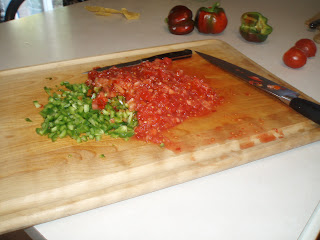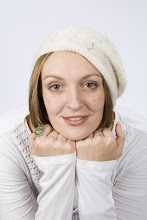 In Annie Dillard's Prologue to An American Childhood, she writes about what the land is and what it once was, tracing its genealogy back through the ages, where only woodpeckers and the occasional "gang of empty-headed turkeys" came through the quiet forests of Pennsylvania (4). She seems to take meaning for her own life from the land she inhabits, writing that "when [all] else has gone from [her] brain," including the faces of her family, "what will be left [...] is topology: the dreaming memory of land as it lay this way and that" (3). How does land touch us so--make us feel grounded, concrete, real? How is it, when we touch the earth, it reaches down inside us, grabbing onto some oft forgotten core? And how is it that despite all the changes the land sees, it still remains the same underneath the frantic rat race of life?
In Annie Dillard's Prologue to An American Childhood, she writes about what the land is and what it once was, tracing its genealogy back through the ages, where only woodpeckers and the occasional "gang of empty-headed turkeys" came through the quiet forests of Pennsylvania (4). She seems to take meaning for her own life from the land she inhabits, writing that "when [all] else has gone from [her] brain," including the faces of her family, "what will be left [...] is topology: the dreaming memory of land as it lay this way and that" (3). How does land touch us so--make us feel grounded, concrete, real? How is it, when we touch the earth, it reaches down inside us, grabbing onto some oft forgotten core? And how is it that despite all the changes the land sees, it still remains the same underneath the frantic rat race of life?Dillard's passage inspired me to revisit the land with my own brood. Maybe something would leave an imprint. At the suggestion of Sydney's physical therapist, the uphill hike around Cress Creek gave direction to desire.
When we arrive, I close my eyes, blinking at the bright sun that glints against interpretive signs along the trail--signs imprinted with discoveries about the faulted land near my native Rexburg. Cress Creek tells the story of the land along the South Fork of the Snake River in Eastern Idaho. Cottonwood trees, some housing eagles' nests, surround the Snake, their leaves shaking with bright yellows and oranges in the late fall wind. Cattails rest in the low marsh. Along the trail, we learn that Indians used the land for food, trappers for pelts, and later settlers for homes and farmland that now expands across areas neighboring the Cottonwoods. At each subsequent age, the land has served a new need, but part of it always remains unchanged.
 An old stagecoach trail intersects the same vision as distant, dormant volcanoes, volcanoes that once rained ash across the landscape. That same ash now composes a large portion of the rock along Cress Creek. Tuff, with its various fragments of fused detritus, tells a story entirely its own. Earlier than the Indians but sometime after volcanic eruptions, the creek comes running down the mountain. Sagebrush, Bitterbrush, Utah and Rocky Mountain Junipers arise from a seemingly dead environment to feed deer and other mountain animals. Watercress grows in the creek water, warmed by geothermal heat, and moose arrive to feed.
An old stagecoach trail intersects the same vision as distant, dormant volcanoes, volcanoes that once rained ash across the landscape. That same ash now composes a large portion of the rock along Cress Creek. Tuff, with its various fragments of fused detritus, tells a story entirely its own. Earlier than the Indians but sometime after volcanic eruptions, the creek comes running down the mountain. Sagebrush, Bitterbrush, Utah and Rocky Mountain Junipers arise from a seemingly dead environment to feed deer and other mountain animals. Watercress grows in the creek water, warmed by geothermal heat, and moose arrive to feed. In the present, my kids run from post to post, searching for tracks, doo-doo, what Liam calls, "Blue's Clues" --anything that might denote an animal roamed across the same dirt. They identify some excrement along the trail as coyote scat, and I don't have the heart to tell them that it most likely came from a species of domestic dog: "Watch out; I think I just heard a coyote in the brush!" They scream and scatter.
In the present, my kids run from post to post, searching for tracks, doo-doo, what Liam calls, "Blue's Clues" --anything that might denote an animal roamed across the same dirt. They identify some excrement along the trail as coyote scat, and I don't have the heart to tell them that it most likely came from a species of domestic dog: "Watch out; I think I just heard a coyote in the brush!" They scream and scatter. My kids would have given their snacks, shoes, siblings to have glimpsed live animal inhabitants, an eagle, rabbit, lizard--anything. Wrong day? Wrong time? Should we have hiked with those trappers of old in order to make that stable and unchanging connection we're so eager to feel with the land? Like my children, I too long to visit some earlier time and place, be transported to experience June rhododendrons in early settled Pennsylvania, where Annie writes, "tall men and women lay exhausted in their cabins, sleeping in the sweetness, worn out from planting corn" (5). I have planted corn; I have slept, exhausted in my bed--but I would give something spectacular to smell those June flowers. We look to the land for comfort, but sometimes what we're searching for isn't there. The eagle passed at a different time of day. The flowers on Cress Creek faded in late summer. If the routines of my life don't organically intersect with settlers, summer, sweetness, I can close my eyes, wait nine months, two years, a half an hour--and suddenly the world is a new place with new possibilities. This is my latest discovery.
My kids would have given their snacks, shoes, siblings to have glimpsed live animal inhabitants, an eagle, rabbit, lizard--anything. Wrong day? Wrong time? Should we have hiked with those trappers of old in order to make that stable and unchanging connection we're so eager to feel with the land? Like my children, I too long to visit some earlier time and place, be transported to experience June rhododendrons in early settled Pennsylvania, where Annie writes, "tall men and women lay exhausted in their cabins, sleeping in the sweetness, worn out from planting corn" (5). I have planted corn; I have slept, exhausted in my bed--but I would give something spectacular to smell those June flowers. We look to the land for comfort, but sometimes what we're searching for isn't there. The eagle passed at a different time of day. The flowers on Cress Creek faded in late summer. If the routines of my life don't organically intersect with settlers, summer, sweetness, I can close my eyes, wait nine months, two years, a half an hour--and suddenly the world is a new place with new possibilities. This is my latest discovery.Wait for it. We close our eyes, and the world turns around again.
 I've seen it happen over and over lately. Each day brings brilliant new surprises. Everything on the land changes for Dillard, from one space of time to the next. Yet across all those passages of time, there are connections, just as Dillard connects the spaces of time during her childhood into one vivid and amazing tapestry, a tapestry as brilliant as each of our own lives. One minute I'm tickling my kids before bed, the next I'm researching scholarly articles, shaking off single guys at LDS dances, responding to student grievances, planting corn. If only I could take a step back and view the marvelous pattern of it all--the landscape not of Cress Creek in the 1800s, 1925, or Pennsylvania in the 50's, but the landscape of my own life. It is the landscape, the topology, that gives meaning and purpose, guidance and direction to our lives. The tapestry, the topology, the hill's curves and juts, the winding river, the cattails in the low marsh, the "land as it lay this way and that."
I've seen it happen over and over lately. Each day brings brilliant new surprises. Everything on the land changes for Dillard, from one space of time to the next. Yet across all those passages of time, there are connections, just as Dillard connects the spaces of time during her childhood into one vivid and amazing tapestry, a tapestry as brilliant as each of our own lives. One minute I'm tickling my kids before bed, the next I'm researching scholarly articles, shaking off single guys at LDS dances, responding to student grievances, planting corn. If only I could take a step back and view the marvelous pattern of it all--the landscape not of Cress Creek in the 1800s, 1925, or Pennsylvania in the 50's, but the landscape of my own life. It is the landscape, the topology, that gives meaning and purpose, guidance and direction to our lives. The tapestry, the topology, the hill's curves and juts, the winding river, the cattails in the low marsh, the "land as it lay this way and that."Next week--Prologue (7-9): Play Me Some Soul Music
































